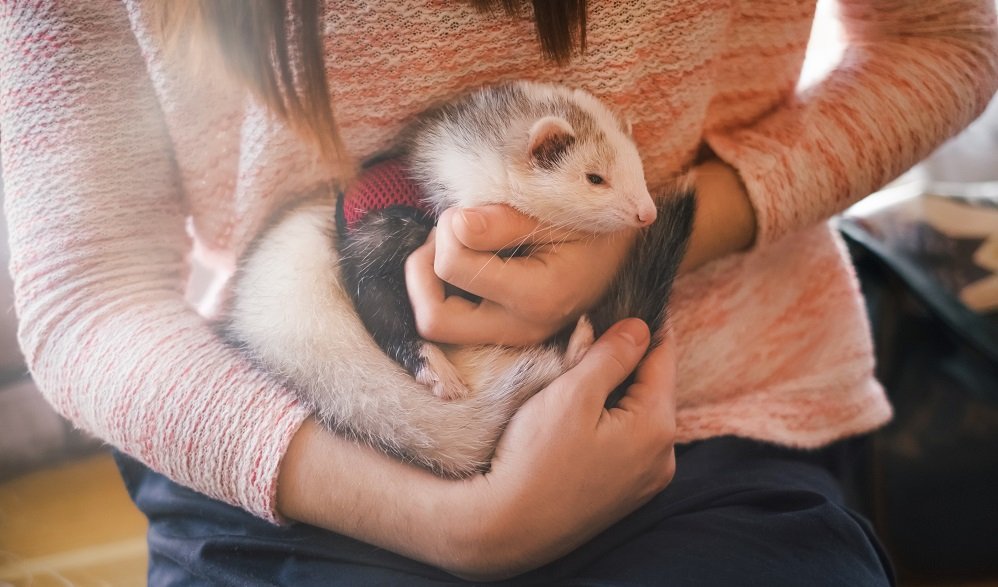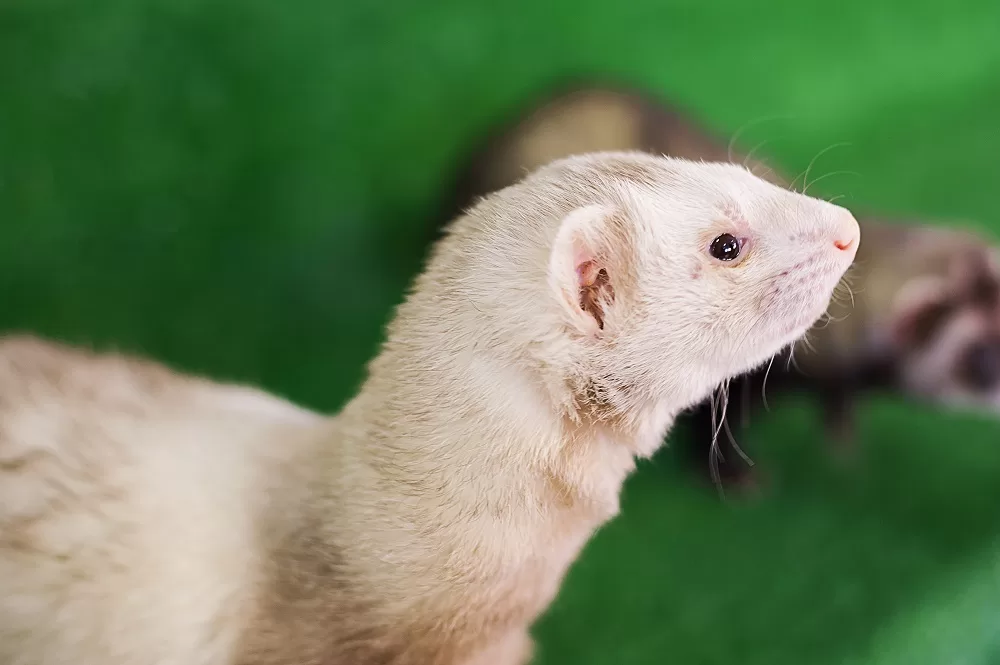Ferrets are some of the most interesting pets to have in your home. They are highly active and playful; amazingly, a group of ferrets is referred to as a “business of ferrets”. These smart fur balls belong to the same family as polecats, weasels, wolverines, otters; among others. It is believed that ferrets have been domesticated for thousands of years and were first brought to America about 300 years ago. If you are thinking about getting an exotic pet, this comprehensive guide sheds more light on everything you need to know about ferrets.
What are ferrets like?
Ferret behaviour is interesting to say the least. The name ferret is derived from the latin word ‘furonem’ – which actually means “thief”. This is not a very good reputation for such a cute little pet. Ferret owners know too well how these cunning creatures tend to hide everything they find around the house. They are social pets and do not thrive alone. They love socialising with other ferrets and human beings. Ferrets compensate for their poor eyesight by having a superior sense of smell and hearing. Life expectancy is about 5 to 7 years. The oldest ferret on record was 14 years old. Ferrets are indeed fragile and in most cases, a household with little children is not ideal for their safety. Mishandling the pets can lead to serious injuries.

Ferrets and cats have something in common; they love their naps! A ferret can sleep up to 20 hours a day. Those who have had ferrets consider them highly active and bouncy. They love to crawl around and can easily be found exploring clothes, paper bags, PVC piping and any other interesting feature they find. Although they are largely harmless, ferrets can easily bite your finger; making it important to train them early. These curious pets can attain a length of up to 16 inches with normal weight reaching 3.5 pounds.
How should ferrets be housed/kept?
Because of their long naps, ferrets can spend a long time in a cage and they do not mind it. Experts suggest that getting about four hours outside the cage is good for them. Having a ferret or two in your house can also spell disaster. These curious creatures can mess your space in a short time. They can also put themselves in danger while doing it. Therefore, it is critical to ferret-proof your house effectively. Also, invest in some good ferret toys
The Marshall Bungee Ferret Toy is an extremely popular choice as ferrets often love playing with this kind of item for hours on end.
Similarly, ferrets love to play in tunnels. Setting up a “Thru-way” for your ferrets is a great way to keep them entertained and occupied. Having tunnels like this in your ferret environment is excellent. Lastly, often many ferret parents love to make or buy their ferrets a “dig box”. A dig box is a box filled with some objects like rice, balls, packing peanuts and so on that allows ferrets to dig and frollick to their hearts’ content. A good and inexpensive option is a Ball Pit (balls are not included).
Ferret Cages
to keep them fully occupied when they are outside their cage. Ferrets should be housed in spacious cages of not less than 18 x 18 x 30 inches. The cage should also have two levels or more with ramps and stairs for climbing. The best option is a wire cage.

The Midwest Deluxe Critter Nation Cage is a large, premium option for housing your ferrets. That said, there are many products to choose from in the market. In fact, the Black Feisty Ferret Cage by Prevue Pet Products offers tons of space for ferrets to run, jump and play. You don’t need to spend too much on your case, there are cheaper options that fulfill the basic housing requirements of your ferrets. The Kaytee My First Home Multi-Level Ferret Cage is an inexpensive multi-storied ferret cage for those on a budget.
Some people use aquariums as ferret enclosures but this is a poor choice. Aquariums tend to have poor ventilation. Because ferrets can squeeze themselves through small spaces, the cage should have smaller gaps together with a secured latch to keep them safe inside. The floor of the cage should have a washable carpet. Any other suitable flooring like linoleum is fine. Some of the flooring to avoid include wood, newspapers, cedar and pine chips. Wood is very hard to disinfect while cedar and pine chips can cause respiratory problems. Newspapers will turn ferret feet black.
Ferret Bedding
Shelves or hammocks are also a good addition for the ferret cage. Toys that promote burrowing are great for the cage and if you have beddings such as blankets or towels, make sure to clean those regularly. Latex rubber or foam toys for ferrets should definitely be avoided. Ferrets can chew and swallow these toys which can lead to choking. When ferrets are outside their cage, ferret-proofing your space can include putting away breakable items, dangerous electrical wires and even poisons. Before turning on the washing machine or dishwasher, make sure you locate your ferret first. These mischievous creatures need a lot of supervision when they are outside their cage.
A great option to consider as bedding for your ferret is a Ferret Hammock. Ferrets are social creatures so they love to sleep together. They absolutely adore sleeping in a hammock. There are many nice ones to choose from. You can consider the dimensions of your cage and how many ferrets you own to decide on which option is suitable for you.
To avoid messes in the cage and outside, make sure to use a proper litter box for your ferret. Pelleted litter products are best instead of cat litter.
This “Critter Litter” is one of the most popular choices on the market. Also, a good option for a Ferret Litter Box is very important. Some ferret owners say the “triangle shaped” litter boxes are best, but there is no evidence that they are more effective. The large size and the high corners of the Kaytee Litter Box option could be the way to go for your ferret.
Direct sunlight for ferrets is detrimental. Provide a cool shade instead on a sunny day.

What do ferrets eat?
Ferrets, just like cats must have meat in their diet. This makes them obligate carnivores. Meat protein that is easily digested is best for ferrets. Make high level fats the top source of calories in a ferret diet. Vegetable protein is not advised for ferrets owing to the poor digestion. Grain should also be avoided in their diet because these pets are not able to digest fiber. Mice and rats are ideal foods for a ferret. However, because finding these whole foods may be unrealistic for many owners, choosing specialized ferret food is a better option. Buy the best ferret food after considering the ingredients therein.Here are some of the most popular ferret foods on the market. Here are some of the most popular options for ferret foods:
- Wysong Dry Ferret Food
- Marshall Pet Products Premium Ferret Diet
- Sheppard and Greene Adult Ferret Food
Its important to note that ferrets can get used to a single food source early on in their lives. So this can make it difficult if for some reason you are unable to locate or source your preferred ferret food. Therefore, many ferret owners feed a variety or mixture of kibble and other food items so as to avoid your ferret becoming too picky.
Ferrets are known to have a short GI tract and it only takes three to four hours to have the food digested. Therefore, you want food that supplies vital nutrients to promote wellness in your pet. The best treats for ferrets are meats like turkey or chicken. Avoid high sugar and grain treats that simply do more harm than good. When a ferret is young, employ a good diet and avoid changing it as they age. Sudden diet changes in ferrets can make them very ill. A fatty acid supplement for your ferret can improve health in addition to a good diet. This will improve a dry coat and dehydrated skin.
Like all other pets, fresh water is critical for your ferret at all times. Make sure to change water daily to avoid contamination. The water should be free from chlorine. Ferrets need to be fed every four hours and surprisingly, they tend not to overeat.
What are the grooming needs of ferrets?
Ferrets are known for their musky odor. Unneutered ferrets come with a much stronger odor and to this effect, you want to keep the ferret well groomed. These pets are generally clean pets and will use water to wash their faces and so on. Most ferrets in North America are neutered and there is no need to worry about a very strong smell. Washing a ferret once or twice a month is enough. Bathing ferrets too often can strip them of natural oils that keep their skin soft. The stripping can also lead to the overproduction of body oils which can promote odor. Be sure to use mild pet products and a good grooming brush when cleaning your pet.
Three important grooming tools that every ferret parent must own are:
The Marshall Ferret Grooming Brush
- the You & Me Tidy Trimmers Nail Cutters for Ferrets
- The EcoTrition Ferret Shampoo

 Most common ferret health concerns
Most common ferret health concerns






Adrenal gland disease
This is one of the most prevalent ailments in ferrets. The causes are believed to include early spaying, poor diet and a lack of UVB light. Early spaying in ferrets is necessary due to the prevention of aplastic anemia. Some of the top signs of adrenal gland disease in ferrets include genital inflammation, irritability, hair loss, itchiness and more. If you notice any of these symptoms, be sure to seek expert help from your small pet veterinarian immediately.
Aplastic anemia
This common ferret ailment presents with pale gums, weakness and lethargy. It mostly affects female ferrets that have been in heat for some time without mating. Spaying females at a young age is the sure way to prevent this condition.
Digestive obstructions
As hinted to above, ferrets tend to chew and bite on many things. In the process, they swallow all manner of things that can cause digestive obstruction. Signs of this problem include weight loss and unusual waste emptying. Ferrets that also lose appetite or cannot seem to keep their food down may have a problem. The best action is to seek medical help immediately because many of these obstructions can be fatal.
Dental issues
Ferrets can suffer from dental cavities which can be excruciatingly painful. To prevent this problem, try to give your pet suitable chew toys to keep their teeth clean. Some people will also gather courage to brush the teeth of their ferret friend regularly. If a tooth is causing pain and is decayed, the best thing is to have it extracted by a professional vet.
Before purchasing a pet ferret or any uncommon indoor pet, make sure that it is legal to do so in your area or location. New York City for example, has banned ferrets as pets. Also, look at the cost of care as highlighted above. Food, housing, grooming and health are some of the top expenses to talk about. Some people find that taking care of a ferret is just like having a dog or cat in terms of their demand. When you finally get your ferret, you can look forward to endless fun activities courtesy of these lovely pets.

